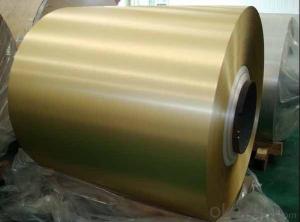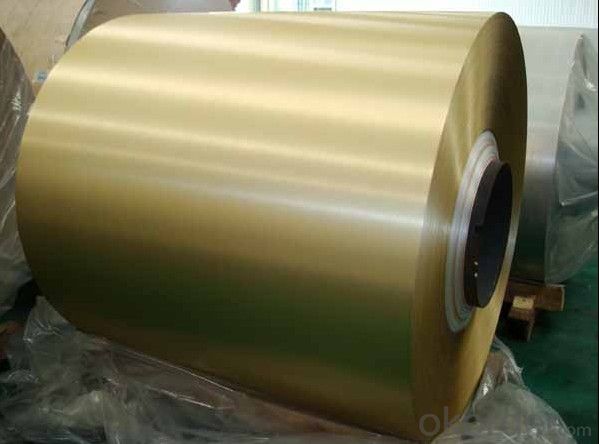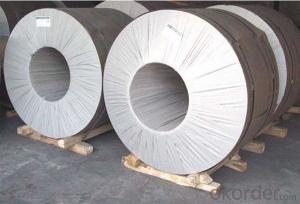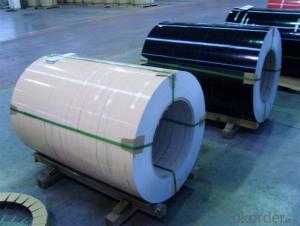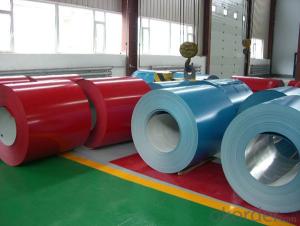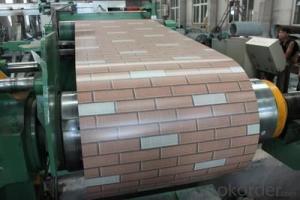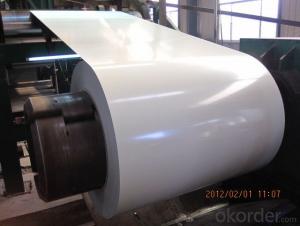Poly Aluminum Coil C83868 for Color Coated Aluminum Roll for Signs and Nameplate
- Loading Port:
- Shanghai
- Payment Terms:
- TT OR LC
- Min Order Qty:
- 3 m.t.
- Supply Capability:
- 50000 m.t./month
OKorder Service Pledge
OKorder Financial Service
You Might Also Like
Specification
Color Coated Aluminium Roll For Signs And Nameplate
Specifications
Alloy | 1050, 1060,1100, 3003 3004 3105 3A21 5005 5052 etc |
Temper | O/H12/H14/H1/H18/H32/H34/H36/H38//H111/H112/H116/H321/T6/T651/T3/T351 etc |
Thickness | 0.1mm to 6mm |
Width | 20mm to 3300mm |
Coil weight | 100kgs to 6 tons depends on actual requirement |
Core material | Aluminum or paper |
Coil inner diameter | 75mm, 150mm, 200mm, 300mm, 405mm, 505mm or as required |
Appplication | construction, roofing, decoration, lamping etc |
Package | eye to wall or eye to the wall for aluminum coil with wood pallet (wooded case also available) |
Characteristics
1) Excellent weather-proof durability
2) Anti-ultraviolet
3) High erosion resistance
4) Stable color and gloss
5) Good mechanical processing performance
6) Abrasion resistance
7) Anti-impact
8) High flexibility
Application
1) Construction material further processing
2) Solar cell frame, solar battery frame
3) Glass curtain wall frame
4) Interior decoration
5) Elevator decoration
6) Signs, nameplate, bags making.
7) Automobile parts material
8) Office and Household appliances: HVAC equipments
9) The consumer electronics: mobile phones, digital cameras, MP3 .etc.
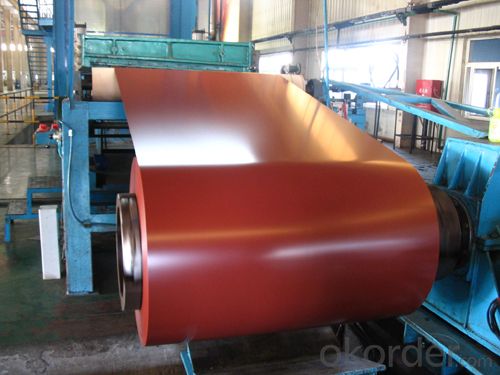
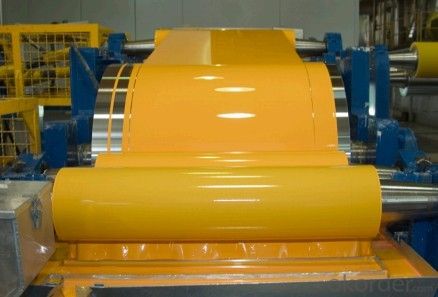
Coating varieties
Polyester Coatings (PE)
PE (polyester) coatings exhibit an excellent combination of hardness, flexibility, flow, appearance, and superior resistance to dirt retention in indoor and outdoor applications. These coatings are highly resistant to abrasion, metal marking, staining, and marring, and require minimal maintenance. Glazetech uses polyester paints which provide excellent colour and gloss retention properties.
Polyvinylidene Fluoride Coatings (PVDF)
PVDF (polyvinylidene fluoride) is a chemical resistant thick film barrier coating commonly used in architectural applications where both excellent appearance and substrate protection must be maintained over a long period of time. This coating is unaffected by most chemicals and solvents and has excellent wear and abrasion resistance. PVDF also has a high dielectric strength, excellent resistance to weathering and the ability to self extinguish.
FAQ
--Q: Do you provide free samples?
--A: Yes, free samples will be sent to you on freight at destination.
--Q: Can I get your latest products catalogue?
--A: Yes, it will be sent to you in no time.
--Q: What is the MOQ?
--A: 2 tons
--Q: What are your payment terms?
--A: We accept L/C, T/T.
--Q: What kinds of alloy can you supply?
--A: 1000 series: 1050, 1060, 1070, 1100, 1145, 1200
3000 series: 3003, 3004, 3105, 3104
5000 series: 5052, 5083, 5754, 5182
6000 series: 6061, 6063, 6062, 6063
8000 series: 8011, 8021
--Q: What’s the coating of top side?
--A: PVDF and PE coating
--Q: What kinds of temper can you supply?
--A: O-H112: O,H12,H14,H16,H18,H22,H24,H26,H,32,H34,H111,H112, T3, T4, T6
- Q: How do aluminum coils contribute to energy-efficient appliance manufacturing?
- Aluminum coils contribute to energy-efficient appliance manufacturing by offering several key advantages. Firstly, aluminum is a lightweight material that reduces the overall weight of appliances, making them easier to transport and reducing energy consumption during transportation. Secondly, aluminum has excellent heat transfer properties, allowing for more efficient heat exchange in appliances like refrigerators, air conditioners, and heat pumps. This leads to improved energy efficiency and reduced electricity consumption. Additionally, aluminum coils are highly durable and resistant to corrosion, ensuring longer appliance lifespans and minimizing the need for replacements. Overall, the use of aluminum coils in appliance manufacturing plays a significant role in enhancing energy efficiency and reducing environmental impact.
- Q: Can aluminum coils be used for architectural applications?
- Yes, aluminum coils can be used for architectural applications. Aluminum is a versatile and lightweight material that is commonly used in construction due to its durability, corrosion resistance, and ease of installation. It can be formed into coils and used for various architectural elements such as roofing, cladding, facades, gutters, and window frames.
- Q: What are the potential applications of coil-coated aluminum coils?
- Coil-coated aluminum coils have a wide range of potential applications due to their excellent properties and versatility. Some of the key potential applications of coil-coated aluminum coils include: 1. Construction and Architecture: Coil-coated aluminum coils are widely used in the construction industry for various applications such as roofing, wall cladding, facades, and decorative elements. The coils can be easily formed, cut, and shaped to meet specific design requirements, while the coil coating provides durability, weather resistance, and color retention. 2. Transportation: Coil-coated aluminum coils find extensive use in the transportation industry, especially in the manufacturing of automobiles, buses, trains, and aircraft. The lightweight nature of aluminum makes it an ideal choice for reducing fuel consumption and improving energy efficiency. Additionally, the coil coating enhances the corrosion resistance, aesthetics, and overall durability of the aluminum coils. 3. Appliances and Electronics: Coil-coated aluminum coils are commonly used in the manufacturing of appliances and electronics such as refrigerators, air conditioners, ovens, and televisions. The coil coating provides a protective layer that prevents corrosion and extends the lifespan of the products. Furthermore, the aesthetic appeal and color options available in coil-coated aluminum coils contribute to the overall design and aesthetics of appliances and electronics. 4. Signage and Displays: The versatility and visual appeal of coil-coated aluminum coils make them a popular choice for signage and displays. The coil coating enhances the durability, weather resistance, and color vibrancy of the aluminum, making it suitable for both indoor and outdoor applications. Whether it's large billboards, shop signs, or exhibition displays, coil-coated aluminum coils offer a cost-effective and visually appealing solution. 5. Packaging: Coil-coated aluminum coils are extensively used in the packaging industry for various applications such as cans, containers, and lids. The coil coating provides a protective layer that prevents the aluminum from reacting with the packaged contents, ensuring product integrity and safety. Additionally, the lightweight nature of aluminum makes it an eco-friendly choice for reducing packaging waste. 6. Energy and Solar: Coil-coated aluminum coils are increasingly being used in the energy and solar industry. The lightweight and corrosion-resistant nature of aluminum make it an ideal material for manufacturing solar panels and energy-efficient systems. The coil coating further enhances the durability and weather resistance of the aluminum, ensuring long-term performance in various environmental conditions. Overall, the potential applications of coil-coated aluminum coils are vast and diverse, ranging from construction and transportation to appliances, signage, packaging, and energy industries. The combination of excellent properties, such as lightweight, durability, weather resistance, and aesthetic appeal, make coil-coated aluminum coils a preferred choice in numerous sectors.
- Q: What is the acceptable range of temperatures for aluminum coils in terms of their functionality and durability?
- <p>The temperature range for aluminum coils can vary depending on the specific application and alloy type. Generally, aluminum coils can operate effectively within a range of -200掳F to 500掳F (-129掳C to 260掳C). For most industrial applications, the working temperature is between -40掳F to 300掳F (-40掳C to 150掳C). However, it's important to consult the manufacturer's specifications for the exact temperature limits of a particular aluminum coil, as these can differ based on the alloy and intended use.</p>
- Q: Are aluminum coils suitable for coil winding applications?
- Coil winding applications can utilize aluminum coils, as they possess numerous advantageous properties. Firstly, aluminum is lightweight, facilitating easier handling and transportation. Industries like automotive and aerospace, which prioritize weight reduction, find this particularly beneficial. Moreover, aluminum exhibits excellent conductivity, ensuring efficient electrical current flow within the coil. This is especially advantageous for applications requiring high performance and low resistance, such as transformers and electric motors. Additionally, aluminum's high resistance to corrosion renders it suitable for outdoor and harsh environments. Unlike metals like steel, it does not rust and can endure exposure to moisture and chemicals. Furthermore, aluminum coils offer cost-effectiveness. Compared to metals like copper, commonly used in coil winding, aluminum is generally more affordable. Thus, it presents a cost-efficient option for various industries. Nevertheless, it is important to acknowledge that aluminum has lower electrical conductivity than copper. Therefore, in applications where high conductivity is paramount, such as power transmission, copper coils may be more suitable. Nonetheless, aluminum coils provide numerous benefits and find widespread use in various coil winding applications.
- Q: How are aluminum coils inspected for quality control?
- Aluminum coils are inspected for quality control through various methods including visual inspection, dimensional checks, and non-destructive testing techniques such as ultrasonic testing, eddy current testing, and X-ray inspection. These inspections help to ensure that the coils meet the required specifications, have no visible defects, and possess the desired mechanical properties before they are used in various applications.
- Q: What are the common testing methods for aluminum coils?
- Some common testing methods for aluminum coils include visual inspection, dimensional measurements, hardness testing, corrosion resistance testing, tensile strength testing, and conductivity testing. These methods help ensure the quality and performance of aluminum coils in various applications.
- Q: How do you store and transport aluminum coils?
- Aluminum coils are typically stored and transported in a variety of ways depending on their size and weight. They are commonly stored in warehouses or outdoor yards, either horizontally on racks or vertically on stands. To prevent damage and ensure stability, aluminum coils are often stacked securely and separated by wooden blocks or spacers. When it comes to transportation, aluminum coils are usually loaded onto flatbed trucks or shipping containers. They may be secured with straps or chains to prevent movement during transit and to ensure their safe delivery to the desired destination.
- Q: What are the different types of edge conditions for aluminum coils?
- There are several different types of edge conditions for aluminum coils, each serving a specific purpose and application. These edge conditions are designed to provide protection, enhance functionality, and ensure compatibility with various manufacturing processes. 1. Mill Edge: This is the standard edge condition produced during the initial rolling process at the mill. It is characterized by a smooth, straight, and burr-free edge. Mill edge coils are suitable for general applications and can be easily processed further. 2. Slit Edge: Slit edge coils are created by cutting the mill edge coils into narrower widths. This process removes a small strip of material along the edges, resulting in a slightly rougher edge compared to mill edge coils. Slit edge coils are commonly used in applications where precise width tolerances are required. 3. Trimmed Edge: Trimmed edge coils undergo further processing to remove irregularities or defects along the edges. This edge condition is achieved by shearing or trimming the coil to eliminate any imperfections. Trimmed edge coils are often used in applications that demand a high level of aesthetics or require a uniform appearance. 4. Deburred Edge: Deburring is a process that involves removing any sharp edges or burrs from the coil. This edge condition is achieved through mechanical or chemical methods, ensuring a smooth and safe edge. Deburred edge coils are commonly used in applications where safety is a concern, such as in the manufacturing of consumer goods. 5. Rounded Edge: Rounded edge coils have their edges rounded or softened to reduce the risk of injury during handling or installation. This edge condition is achieved through a variety of methods, including roll forming or edge rolling. Rounded edge coils are often used in applications where safety is paramount, such as in the construction industry. 6. Specialty Edge Conditions: In addition to the standard edge conditions mentioned above, there are also specialty edge conditions available for specific applications. These may include edge conditions designed for specific manufacturing processes like welding, bending, or forming. Specialty edge conditions are tailored to meet the unique requirements of certain industries or applications. It is important to select the appropriate edge condition for aluminum coils based on the specific requirements of the application. Factors such as aesthetics, functionality, safety, and manufacturing processes should all be considered when determining the most suitable edge condition.
- Q: How do aluminum coils perform in high-pressure applications?
- Aluminum coils generally perform well in high-pressure applications due to their inherent strength and durability. The high-pressure environment requires materials that can withstand the force and maintain their structural integrity without deformation or failure. Aluminum coils are known for their excellent tensile strength, which allows them to handle high-pressure conditions without buckling or collapsing. Furthermore, aluminum is highly resistant to corrosion, making it ideal for applications where exposure to moisture or harsh chemicals is a concern. This corrosion resistance ensures that the coils will not deteriorate or weaken over time, even under high-pressure conditions. In addition to their mechanical properties, aluminum coils also possess excellent thermal conductivity. This property allows them to efficiently transfer heat away from the high-pressure environment, thereby preventing overheating and maintaining stable operating conditions. The thermal conductivity of aluminum also aids in rapid heat dissipation, enhancing the overall performance of the coils in high-pressure applications. Moreover, aluminum coils are lightweight compared to other metals, making them easier to handle and install in high-pressure systems. Their lightweight nature also reduces the overall weight of the system, which can have advantages in terms of energy consumption and transportation costs. However, it is important to note that the specific performance of aluminum coils in high-pressure applications may vary depending on the grade and thickness of the aluminum used. It is crucial to select the appropriate aluminum alloy and gauge based on the specific requirements of the application to ensure optimal performance and longevity.
Send your message to us
Poly Aluminum Coil C83868 for Color Coated Aluminum Roll for Signs and Nameplate
- Loading Port:
- Shanghai
- Payment Terms:
- TT OR LC
- Min Order Qty:
- 3 m.t.
- Supply Capability:
- 50000 m.t./month
OKorder Service Pledge
OKorder Financial Service
Similar products
Hot products
Hot Searches
Related keywords
